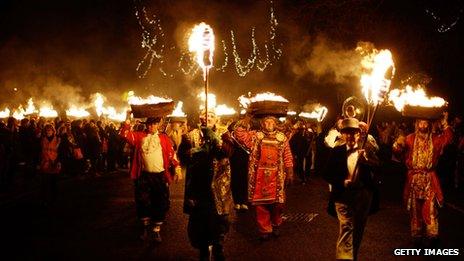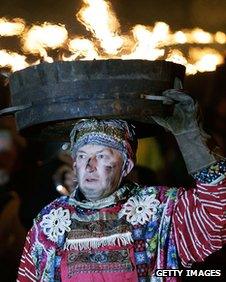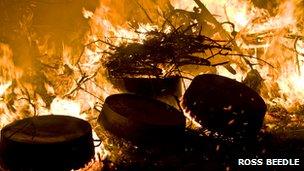Burning barrels for the Tar Barl Festival
- Published

Only men from Allendale are allowed to carry the flaming barrels
While most were raising a glass on New Year's Eve, 45 men were raising something else - burning barrels filled with tar, sawdust, kindling and paraffin on their heads.
The Tar Barl Festival has been Allendale's way of welcoming the new year for at least 160 years.
The normally quiet village heaves with people - locals, visitors and the barrel-carrying "guisers" wearing fancy dress or a disguise.
A fiery procession swarms round the Northumberland village, returning to the square just before midnight to throw its barrels on to the waiting bonfire, setting it alight.
Rod Milburn, who has been a guiser since he was 17, admits there is a level of fear.
"You're probably scared every time you do it," he said. "But the more years you do it the less scared you are.
"I wouldn't be anywhere else at new year."
Mr Milburn's father did it, his father-in-law and brother-in-law both do it and, he says, his son might take up the tradition.
Sylvia Milburn, his mother, is half hoping her grandson will not, just yet.
'Quite staggered'
Over the years she has watched her men anxiously, but would not dream of trying to stop them.
"I find it quite emotional. It's a spectacle that you should see. To see all these men carrying blazing barrels - it's quite something."

Many of the guisers' costumes date back decades
Originally from Newcastle, she was "quite staggered by what happened" when she first saw the event.
"I couldn't believe it," she said.
Being a woman, she was destined to be a spectator - the guisers are always men.
In the 1950s, after great debate, special dispensation was granted to "one of a pair of maiden sisters" who had made a collection of guising costumes, some of which are still worn.
"It was a serious business, having a lady carrying a barrel," said former committee chairman Hilton Walker.
No woman has been allowed to do it since.
Now 84, Mr Walker carried a barrel every year since 1946, and only recently swapped it for a lighter, but still flaming, torch.
"Once the barrels are alight the whole village is illuminated," he said.
Distillery cast-offs
The origins of the festival are unclear, with claims for both pagan and Christian roots.
Mr Walker said they can only definitively date it back to the mid 1800s, though some say it harks from the Middle Ages.
Bah'l, Bahl, Bar'l and Baal - the spellings are various - is a contraction of 'barrel'.
The yearly need for these barrels for the festival meant that people took to "borrowing" them, said Mr Walker.
Barrels used for tar, water, washing - even flowers - were "vulnerable" to theft.
In the mid 1950s, a large number were stolen from the site of road repairs in nearby Alston, attracting attention from police.
"An awful lot of barrels were parked by the side of the road, empty of tar of course, and they mysteriously came across to Allendale," said Mr Walker
He said the police had a "shrewd" idea where they had gone and made it known they must be returned or there would be consequences.
A committee was formed to co-ordinate a search for a legitimate supply and they discovered the bounty of whisky distillery cast-offs.
'Very responsible'
The festival is held in all weathers.
"Come wind, snow or hail, you've just got to do it," said Kevin Lee, a guiser for about 25 years.
"It takes a bit of skill and getting used to."
He has only been burned once - when a spark fell on an ill-judged synthetic costume.

The bonfire is now fenced off but the fire service has never been called to the festival
Potential candidates to carry the barrels are vetted by the committee for "suitability" and receive training to make sure they are strong enough.
"They're pretty heavy these things," Mr Walker said. "And on fire at the time."
A few years ago the festival attracted attention from health and safety officials. The bonfire is now fenced off and the parade has marshals with fire extinguishers.
Northumberland Fire and Rescue are on standby just in case, but they say they have never once been called to an incident at the event.
"Everyone behaves in a very responsible manner," said Mr Walker.
In all the years the festival has been going, no-one has been hurt.
- Published1 January 2012